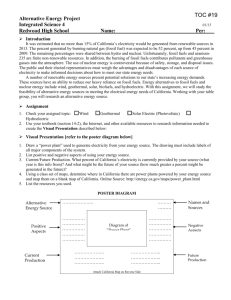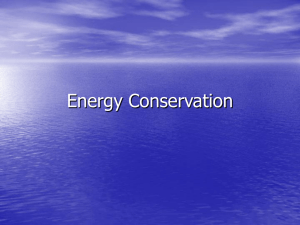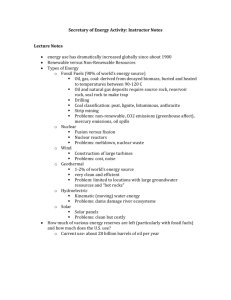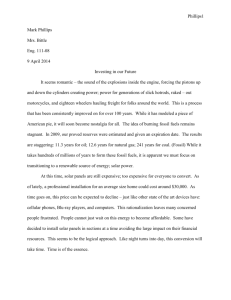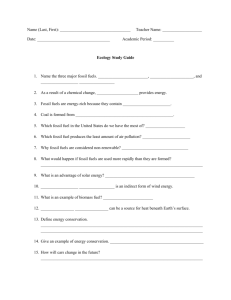Unit 9 Study Guide
advertisement
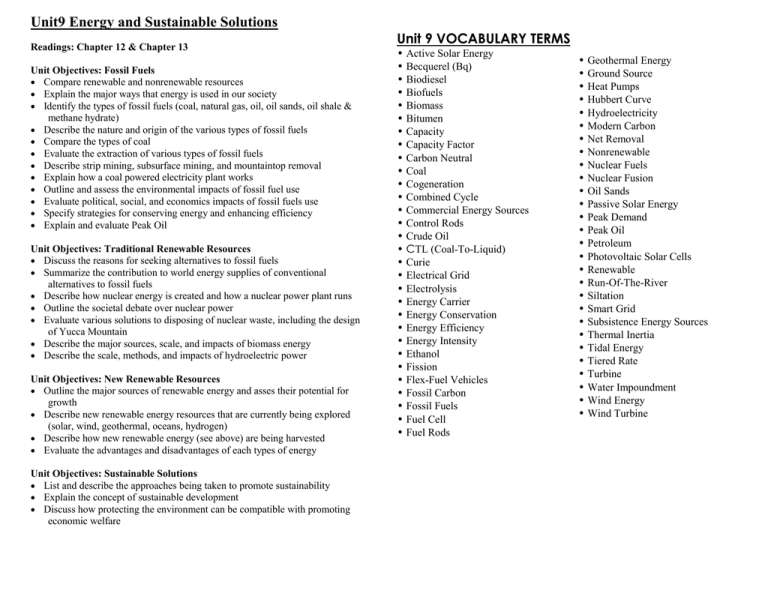
Unit9 Energy and Sustainable Solutions Readings: Chapter 12 & Chapter 13 Unit Objectives: Fossil Fuels Compare renewable and nonrenewable resources Explain the major ways that energy is used in our society Identify the types of fossil fuels (coal, natural gas, oil, oil sands, oil shale & methane hydrate) Describe the nature and origin of the various types of fossil fuels Compare the types of coal Evaluate the extraction of various types of fossil fuels Describe strip mining, subsurface mining, and mountaintop removal Explain how a coal powered electricity plant works Outline and assess the environmental impacts of fossil fuel use Evaluate political, social, and economics impacts of fossil fuels use Specify strategies for conserving energy and enhancing efficiency Explain and evaluate Peak Oil Unit Objectives: Traditional Renewable Resources Discuss the reasons for seeking alternatives to fossil fuels Summarize the contribution to world energy supplies of conventional alternatives to fossil fuels Describe how nuclear energy is created and how a nuclear power plant runs Outline the societal debate over nuclear power Evaluate various solutions to disposing of nuclear waste, including the design of Yucca Mountain Describe the major sources, scale, and impacts of biomass energy Describe the scale, methods, and impacts of hydroelectric power Unit Objectives: New Renewable Resources Outline the major sources of renewable energy and asses their potential for growth Describe new renewable energy resources that are currently being explored (solar, wind, geothermal, oceans, hydrogen) Describe how new renewable energy (see above) are being harvested Evaluate the advantages and disadvantages of each types of energy Unit Objectives: Sustainable Solutions List and describe the approaches being taken to promote sustainability Explain the concept of sustainable development Discuss how protecting the environment can be compatible with promoting economic welfare Unit 9 VOCABULARY TERMS • Active Solar Energy • Becquerel (Bq) • Biodiesel • Biofuels • Biomass • Bitumen • Capacity • Capacity Factor • Carbon Neutral • Coal • Cogeneration • Combined Cycle • Commercial Energy Sources • Control Rods • Crude Oil • CTL (Coal-To-Liquid) • Curie • Electrical Grid • Electrolysis • Energy Carrier • Energy Conservation • Energy Efficiency • Energy Intensity • Ethanol • Fission • Flex-Fuel Vehicles • Fossil Carbon • Fossil Fuels • Fuel Cell • Fuel Rods • Geothermal Energy • Ground Source • Heat Pumps • Hubbert Curve • Hydroelectricity • Modern Carbon • Net Removal • Nonrenewable • Nuclear Fuels • Nuclear Fusion • Oil Sands • Passive Solar Energy • Peak Demand • Peak Oil • Petroleum • Photovoltaic Solar Cells • Renewable • Run-Of-The-River • Siltation • Smart Grid • Subsistence Energy Sources • Thermal Inertia • Tidal Energy • Tiered Rate • Turbine • Water Impoundment • Wind Energy • Wind Turbine

